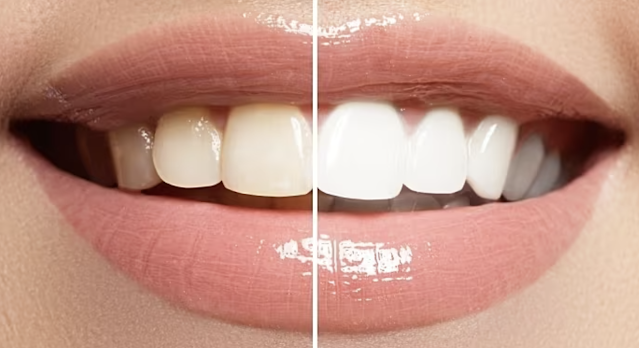Natural Ways to Whiten Your Teeth at Home
A bright smile may be the first thing you notice about a person, but a closer look could reveal that their teeth are less than bright. The majority of Americans desire whiter teeth, and millions are spent each year on over-the-counter and in-office treatments to achieve this goal.
As a result, many have wondered if there are natural home treatments that are safe and effective to whiten teeth. The good news is that you probably have ingredients in your kitchen that can be used to help whiten your teeth and produce a more confident smile.
Baking Soda
Baking soda tops the list as the best-known natural ingredient for tooth whitening. You probably have a box in your kitchen pantry. It’s inexpensive, safe for many purposes, and can be found anywhere. And it can play a starring role in your dental routine.
Baking soda is naturally a mild abrasive, making it perfectly suited for gently scrubbing away plaque from the surface of teeth. It’s also an effective tool in the fight against surface tooth staining. A review of clinical studies examining the stain-removing effectiveness of baking soda published in the November 2017 edition of the Journal of the American Dental Association, consistently found that “baking soda-based dentifrices are effective and safe for tooth stain removal and consequently whitening”—and sometimes even more effective than their non-baking soda-containing counterparts.
Baking soda also has antibacterial and antimicrobial properties, which can help with the prevention of oral infections. At 10 cents per ounce or less, it’s the most affordable option available for at-home whitening.
Hydrogen Peroxide
Hydrogen peroxide is a natural bleaching agent which, like baking soda, is inexpensive and readily available. Since studies so far have focused on manufactured teeth-whitening products that contain hydrogen peroxide, instead of hydrogen peroxide alone, the long-term effects on teeth of direct exposure to hydrogen peroxide are unknown.
However, based on the research that has been done, there are some good indications.
The hydrogen peroxide that’s most commonly found in drugstores is diluted to a 3 percent solution. Commercial teeth-whitening products containing hydrogen peroxide often contain two or three times that concentration.
One randomized controlled trial comparing different concentrations of hydrogen peroxide in toothpaste, published in the December 2020 Journal of Dentistry, found that higher concentrations of hydrogen peroxide resulted in greater stain removal. But, some safety concerns exist.
Diluted solutions of 3 percent hydrogen peroxide or less are generally considered to be safe to use as whitening agents when used for short amounts of time. A 1.5 percent solution (made by mixing 3 percent hydrogen peroxide with water in equal parts) can be used as a mouth rinse.
Alternately, making toothpaste out of a small amount of baking soda mixed with enough hydrogen peroxide to make a paste, is also an easy tooth cleaning and whitening option.
Using higher concentrations of hydrogen peroxide, for longer amounts of time (more than one-minute swishing or two minutes brushing) or too frequently (more than once or twice daily), can actually damage teeth by eroding enamel, and lead to inflammation, cavities, and even an increased risk of oral cancer. Bottom line: In low concentrations, hydrogen peroxide can help whiten teeth—just be careful not to overdo it.
Oil Pulling
Oil pulling has its roots in traditional Indian, or Ayurvedic medicine, and involves swishing a small amount of oil around in the mouth and in between the teeth for up to 20 minutes to remove (or “pull”) bacteria and improve dental health. It’s also thought to help remove toxins from the body.
This practice may not be very familiar in Western circles, but some scientific data supports the use of oil pulling for oral and dental health, resulting in decreased plaque accumulation and incidence of gingivitis. Coconut oil is often used because of its pleasant taste and known health benefits.
While there’s no solid evidence showing that oil pulling does work to whiten teeth, a quick online search will turn up plenty of testimonies from people who believe that it did help give them a brighter smile. The practice is very safe, if somewhat time-consuming, so it doesn’t hurt to give it a try. Just don’t spit the oil down the drain, since it could clog pipes.
Fruit and Fruit Enzymes
Celebrity media often buzzes with excitement at the beauty secrets of famous beautiful women. Such was the case when actress Catherine Zeta-Jones revealed that she rubs strawberries on her teeth to clean and whiten them. As it turns out, strawberries (and other fruits) contain malic acid, which can actually whiten teeth. But beware, there’s a major downside to this method—the berries also contain citric acid—and both acids will erode tooth enamel with prolonged exposure. If you try this method, keep it short.
Papain and bromelain, fruit enzymes that are found in papayas and pineapples, respectively, have been shown in clinical studies to work as effective stain removers when used as active ingredients in toothpaste. The same effects weren’t found by simply eating the fruits though.
The Culprits
A number of foods and drinks are notorious tooth stainers, including coffee, tea, red wine, sodas, and intensely colored foods such as blueberries and cherries. Teeth naturally yellow somewhat with age, too, as the enamel gradually wears down, revealing more of the yellow dentin layer beneath it.
While most of us aren’t likely to give up our morning coffee or blueberry muffins for the sake of whiter teeth, we can reduce the chance these foods have to stain our teeth by practicing good oral hygiene—limiting the amount of sugar we consume, which contributes to plaque build-up, brushing and flossing regularly, and making regular visits to the dentist.
Reposted from: https://www.theepochtimes.com/health/natural-ways-to-whiten-your-teeth-at-home_5063865.html







Comments
Post a Comment